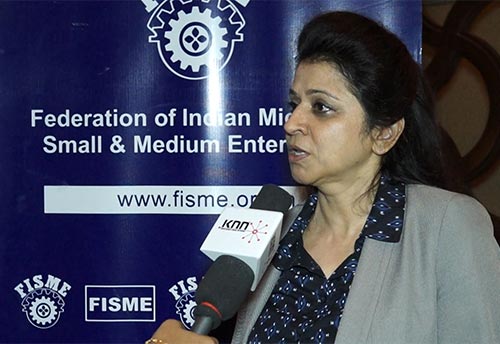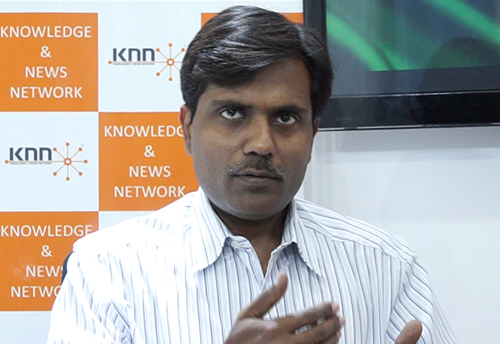Challenges and opportunities for MSMEs in USD 200 bn Defence market (KNN Exclusive)
Updated: Jun 13, 2015 12:47:30pm
The small sector carries the brunt of bearing the technology gap, delayed payments, less credit flow and non-access to the luring market. KNN spoke exclusively to Dr V K Saraswat, Member NITI Aayog and former Secretary of Defence (Research & Development) and Director General of Defence Research & Development Organization (DRDO), to learn that what are the roadblocks which have created a wall between the MSMs and USD 200 billion worth opportunities.
How can the MSMEs associate themselves with the ‘Make in India’ program in defence sector?
Defence sector is giving lot of opportunities today for the participation of MSMEs. Already the growth of MSMEs is due to the three major sectors in this country - Defence, Aerospace and atomic energy. Because of these three sectors the contribution of MSMEs has increased considerably. Today, MSMEs are not just the component manufactures; they are making subsystems like activators, computers and many other devices, so growth is considerably high. Now the, opportunity in defence sector is so much that there are approximately 150 billion dollars of indigenous production which is emerging in the sectors of aircraft, tanks, guns, unmanned systems etc. Participation of MSMEs could be through the participation with the R&D institutions, and directly making use of the offsets which are being provided under the “Make in India “program. So in that, 30 per cent offset amounts to 20 billion dollars. Now that is an opportunity. For this, the MSMEs will have to upgrade themselves, in terms of their business processes, design capabilities, certain infrastructure which is required in the modern day manufacturing for the aerospace. The complexity of aerospace system is unique. It is technologically complex, it has small volume but it’s a high cost item. So turn over wise it will be a great help. MSMEs, if work with academic institutions, R&D institutions, and defence PSUs and ordinance factories as Tier 2 and Tier 3 companies, the growth will automatically happen and their participation in the defence production will be enormous. Already they are contributing to about 8 per cent of the GDP. I am sure they have an opportunity of taking this 8 per cent to about 15 per cent.
Technology is a major hindrance for the MSMEs, so will there be any handholding for them?
Yes. Therefore I have suggested, that wherever the technology gaps are there, work with R&D Institutions because they will transfer the technology to the MSMEs. This has already happened in the past. Many MSMEs have benefitted from the technologies which got developed in the three strategic departments of our country.
50 per cent additional weightage has been given to MSMEs in the defence offset, still why the procurements from the MSMEs are not picking up?
No, it is not lagging behind, it is just the projection which has been made in terms of what is the level for which it is applicable, has not got down well with the foreign companies. Because the moment they look at the company which has got a capital of this much amount, they are entitled for 1.5 but the matching technology, capability is not found in these companies. As a result, they are not able to capture this market. But possibilities are there if they work with R&D even in this sector.
What are the big announcements that are expected in the defence procurement policy for the MSME Sector?
As Honorable Raksha Mantri has already mentioned, it is going to be a simpler system of carrying out business, nothing other than that, because it is still evolving. I am sure things will be looking upto a new course. Simplicity of operation is the buzzword.
Do you think the seminar organized by FISME on ‘Opportunities for MSMEs in the Defence Sector’ will be helpful in bringing more opportunities to the doors of MSMEs?
Yes absolutely! I think this kind of a seminar and this kind of interaction brings in synergy among industries, synergy with the government, synergy with the policy makers and also gives an opportunity to solve each other’s problem. This is the best platform for improvement.
What role can the industry association play in bringing opportunities to the MSMEs or in help them upgrade their technologies?
I was talking to the large number of participants. I found a lack of information, knowledge about the emerging market. The association should be able to create a portal by which they can consolidate the emerging markets in the defence sector through various agencies like the research agencies, the public sector agencies and then be a feeder to these individual MSMEs based upon their capability as to identifying what market they should capture. This will be a great service. Suppose you don’t have a capability to work for a particular industry, these associations can create a holding company where centralized facilities e.g. qualification testing, NDT testing; associations can create a holding company and under this company, these services can be provided, so that the repeated investment in each SME or MSME would not be required. Like this, many things can be done by these associations for improving MSMEs.
The foreign contractors are asking to include the cost of technology provided to MSME suppliers in the defence offset. Do you agree?
No. When a contract is made, technology supplied is also a part of this offset. So there is no question of paying separately for the technology transfer or things like that, unless the offset is coming in the form of technology transfer. But is offset is coming in terms of manufacturing that component there is no payment to be made by the industry to the offset provider, for the technology inputs. (KNN/SD)











